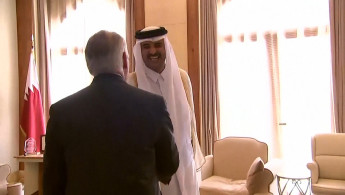US Secretary of State Rex Tillerson makes unexpected return to Qatar for blockade talks
The US secretary of state returns to Qatar for talks after a meeting with anti-Doha countries in Saudi Arabia failed to break the blockade.
2 min read
US Secretary of State Rex Tillerson will meet Qatar's Emir Sheikh Tamim bin Hamad al-Thani in Doha on Thursday, as diplomatic deadlock between Gulf states continues.
Tillerson's unexpected return to Doha comes after Wednesday's talks with Saudi Arabia's King Salman and Crown Prince Mohammed bin Salman failed to end a blockade on Qatar, which has been in place since June.
The US diplomatic head's act of shuttle diplomacy aims at ending the stand-off between Washington's Gulf allies, which has seen several Arab states end diplomatic relations with Doha.
The Saudi-led alliance has accused Qatar of supporting terrorism, having close relations with Iran, and using exiled activists and media outlets to attack Arab regimes.
Doha denies the charges, while the US and European powers have quietly backed Qatar in the dispute.
Tillerson's trip to Saudi Arabia failed to reach any fruitful consensus despite Qatar signing a memorandum of understanding with the US on combating terrorism.
"I think Qatar has been quite clear in its positions, and I think those have been very reasonable," Tillerson told reporters.
The Saudi-led alliance said the measure would not be enough to end the crisis.
UAE Foreign Minister Abdullah bin Zayed al-Nahayan added that Tillerson's visit wouldn't settle the row.
Tillerson has visited Qatar, Kuwait and Saudi Arabia before returning to Doha on Thursday during a four-day trip to tackle the impasse.
French Foreign Minister Jean-Yves Le Drian will visit Qatar, Saudi Arabia, the UAE and Kuwait this week to speak to Gulf leaders.
Saudi Arabia, the UAE, Egypt and Bahrain issued a 13-point ultimatum to Qatar last month, which included demands to close a Turkish military base, shuttering al-Jazeera, and ending relations with Iran.
Qatar called the demands "unreasonable" and said it infringed on its "sovereignty".
Tillerson's unexpected return to Doha comes after Wednesday's talks with Saudi Arabia's King Salman and Crown Prince Mohammed bin Salman failed to end a blockade on Qatar, which has been in place since June.
The US diplomatic head's act of shuttle diplomacy aims at ending the stand-off between Washington's Gulf allies, which has seen several Arab states end diplomatic relations with Doha.
The Saudi-led alliance has accused Qatar of supporting terrorism, having close relations with Iran, and using exiled activists and media outlets to attack Arab regimes.
Doha denies the charges, while the US and European powers have quietly backed Qatar in the dispute.
Tillerson's trip to Saudi Arabia failed to reach any fruitful consensus despite Qatar signing a memorandum of understanding with the US on combating terrorism.
"I think Qatar has been quite clear in its positions, and I think those have been very reasonable," Tillerson told reporters.
The Saudi-led alliance said the measure would not be enough to end the crisis.
UAE Foreign Minister Abdullah bin Zayed al-Nahayan added that Tillerson's visit wouldn't settle the row.
Tillerson has visited Qatar, Kuwait and Saudi Arabia before returning to Doha on Thursday during a four-day trip to tackle the impasse.
French Foreign Minister Jean-Yves Le Drian will visit Qatar, Saudi Arabia, the UAE and Kuwait this week to speak to Gulf leaders.
Saudi Arabia, the UAE, Egypt and Bahrain issued a 13-point ultimatum to Qatar last month, which included demands to close a Turkish military base, shuttering al-Jazeera, and ending relations with Iran.
Qatar called the demands "unreasonable" and said it infringed on its "sovereignty".





 Follow the Middle East's top stories in English at The New Arab on Google News
Follow the Middle East's top stories in English at The New Arab on Google News
![Netanyahu furiously denounced the ICC [Getty]](/sites/default/files/styles/image_330x185/public/2024-11/GettyImages-2169352575.jpg?h=199d8c1f&itok=-vRiruf5)
![Both Hamas and the Palestinian Authority welcomed the ICC arrest warrants [Getty]](/sites/default/files/styles/image_330x185/public/2024-11/GettyImages-2178351173.jpg?h=199d8c1f&itok=TV858iVg)
